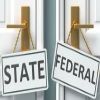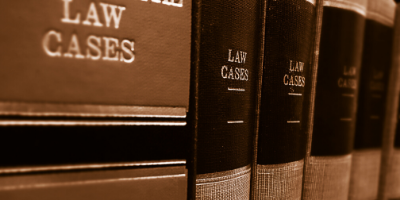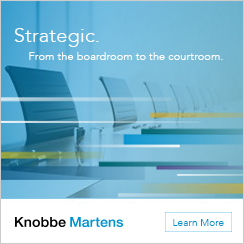Quarterly Journal 50-2
In This Section
The AIPLA Quarterly Journal, a publication of the American Intellectual Property Law Association, is housed at the George Washington University Law School and is edited and managed by an Editorial Board of intellectual property experts and a staff of law students under the direction of the Editor-in-Chief, Professor Joan Schaffner.
The Quarterly Journal is dedicated to presenting materials relating to intellectual property matters and is published four times per year. Editorial Board members (all of whom are lawyers) are selected based upon demonstrated interest and experience, and student staff members are selected from the students of the GWU Law School.
This year marks the 50th Anniversary of the Quarterly Journal. Watch for the special anniversary edition later this year. Many thanks to our issue advertiser CAS! We'd also like to thank our 125th Anniversary Sponsors
 QJ 50.2 - States Can Infringe Upon Your Intellectual Property Rights with Impunity in the Era of “New Federalism”
QJ 50.2 - States Can Infringe Upon Your Intellectual Property Rights with Impunity in the Era of “New Federalism”
Homayoon Rafatijo and Dennis D. Crouch
The FBI Anti-Piracy Warning provides that “unauthorized reproduction or distribution of a copyrighted work is illegal.” In Allen v. Cooper, the Supreme Court effectively qualified this warning by adding an exception in favor of “sovereign” pirates. In allowing the states to usurp citizens’ intellectual property rights, the justices of the Allen Court prioritized either a dogmatic form of stare decisis or the New Federalist ideology over the Constitution and its structure and history. The Allen Court largely based its decision upon a perceived historic kinship between patents and copyrights, concluding that if not patent, then not copyright. This article walks through the historical record, especially in the period following the Federal Convention, and reports key differences between the patent and copyright systems that that tilt toward a conclusion that the States agreed “to be subordinate to the government of the United States” in the copyright space. In the end, Allen creates serious practical problems for copyright holders. The decision emboldens copyright infringement by state actors by cutting-off the possibility of any recovery of damages for the infringement.
 QJ 50.2 - #BlackLivesMatter: A Hashtag, a Rallying Cry, a Social Movement, a Global Network but not a Trademark: An Analysis of Trademark Protection for the Well‐Turned Phrase of a Social Movement (Slogans, Taglines, Mottoes, and Hashtags)
QJ 50.2 - #BlackLivesMatter: A Hashtag, a Rallying Cry, a Social Movement, a Global Network but not a Trademark: An Analysis of Trademark Protection for the Well‐Turned Phrase of a Social Movement (Slogans, Taglines, Mottoes, and Hashtags)
Miriam A. Smith
Social media thrives on phrases that capture a moment or a mood. “Black Lives Matter” is just one of many phrases that have resonated. In response to the growing interest in obtaining trademark protection for social media phrases, the USPTO issued Examination Guide 2-17 on Merely Informational Matter in July 2017. This article reviews trademark protection as it relates to the well-turned phrases of social movements. While most applications to monopolize a slogan by means of trademark law protection have been refused, some registrations have been approved. Scholars have argued for various modifications to existing law and procedure in the interest of fairness and to prevent opportunistic trademarks. This article examines these various recommendations and advocates for a modification to existing law and procedure that elevates the requirement for acquired distinctiveness and restricts the monopoly on a phrase to those who originated that phrase. We also argue that iconic well-turned phrases must receive the same protection famous trademarks receive—protection from dilution.
 QJ 50.2 - MuSIC: A Levy System to Support Struggling Musical Artists
QJ 50.2 - MuSIC: A Levy System to Support Struggling Musical Artists
Matthew Ascoli
Despite Congress’ statutory efforts to protect creative works and secure fair compensation for their creators, the American musician is mired in unfair contracts, minimal payouts from music streaming services, and an inadequately supportive copyright law regime. Proposed and attempted solutions are either insufficient or have failed in practice. This note explains how Congress should create the Musicians’ Supplemental Income Compensation (“MuSIC”) Fund – a compensation fund to provide monthly payments to low-earning artists, supported by the proceeds of a modest levy on goods and services involved in music performance and consumption. This solution will make a musical career a viable option for more artists who can then progress the art, despite the many issues in the American music industry.
 QJ 50.2 - From Lil Wayne’s “Lighter Flick” to Travis Scott’s “It’s Lit,” the Future of Sound Trademark in the Music Industry
QJ 50.2 - From Lil Wayne’s “Lighter Flick” to Travis Scott’s “It’s Lit,” the Future of Sound Trademark in the Music Industry
Justin Krumper
Recording artist Pitbull is leading a revolution in the music IP game by trademarking his signature yell. When Pitbull was granted his trademark by the United States Patent and Trademark Office (USPTO), he became one of the first musical artists to trademark their signature sound. However, while Pitbull’s trademark is unique, having a signature sound is not. Chance the Rapper’s “Igh,” Travis Scott’s “It’s Lit,” DaBaby’s “Let’s Go,” and Lil Wayne’s lighter flick are just a few of many artists with signature sounds. All of them may soon be looking to capitalize on these sounds in the same way Pitbull has, but the USPTO has no specific standard in place for vetting this type of sound mark in its supporting role of the Lanham Act. To account for the potential coming wave following Pitbull, the Lanham Act must be amended with a specific standard to effectively administrate the review of sound marks in the music industry, in order to ensure that the purpose of the Lanham Act is upheld. This note proposes a specific standard for the Lanham Act to adopt using a sliding scale that measures (1) length of use and (2) connection in the public’s mind.
 QJ 50.2 - The Jury’s Role in Granting Reasonable Royalty: Right or Wrong?
QJ 50.2 - The Jury’s Role in Granting Reasonable Royalty: Right or Wrong?
Menglin Sun
Patent remedies are granted pursuant to 35 U.S.C. § 283 and § 284. According to the statute, a court may grant an injunction to stop the defendant from further infringement and may grant compensatory damages no less than a reasonable royalty. For a long time, reasonable royalty has been the floor that compensatory damages can never fall below. However, as the language of the statute and early case law have been unclear, there have been debates about whether it is appropriate for the jury to decide on reasonable royalties. This article discusses why juries should be able to award reasonable royalties by taking a deeper look at the statute itself, the early common law cases establishing the concept of reasonable royalty, and the legislative history of the statute.
Upcoming Events
-
.png?sfvrsn=48c235e_1) 2026 Patent Prosecution Bootcamp - Arlington, VA
2026 Patent Prosecution Bootcamp - Arlington, VA
March 4 to 6, 2026 | Up to 1235 minutes, including 60 Ethics minutes
-
 AIPLA CLE Webinar: Damages 2025 Year-in-Review: Lessons and Litigation Strategies
AIPLA CLE Webinar: Damages 2025 Year-in-Review: Lessons and Litigation Strategies
March 11, 2026 2:00 PM to 3:30 PM | Eligible for up to 90 Mins CLE
-
.png?sfvrsn=20d96f46_1) AIPLA LinkedIn Live: What the 2025 AIPLA Economic Survey Reveals About IP Practice Today
AIPLA LinkedIn Live: What the 2025 AIPLA Economic Survey Reveals About IP Practice Today
March 12, 2026 12:00 PM to 12:45 PM
-
2026 Women in IP Global Networking Event
April 16, 2026
The annual Global Networking Event connects intellectual property practitioners from around the world for a day of networking, education, and creating meaningful connections. This year’s theme, Rooted in Real - Women in IP Redefining the Narrative, is an opportunity for the AIPLA Women in IP Law Committee to celebrate authentic experiences, foster genuine connections, and showcase the real stories of women shaping the field of intellectual property law. -
-(1).png?sfvrsn=169c8b82_1) Careers in IP
Careers in IP
April 22, 2026 12:30 PM to 1:30 PM | No CLE

